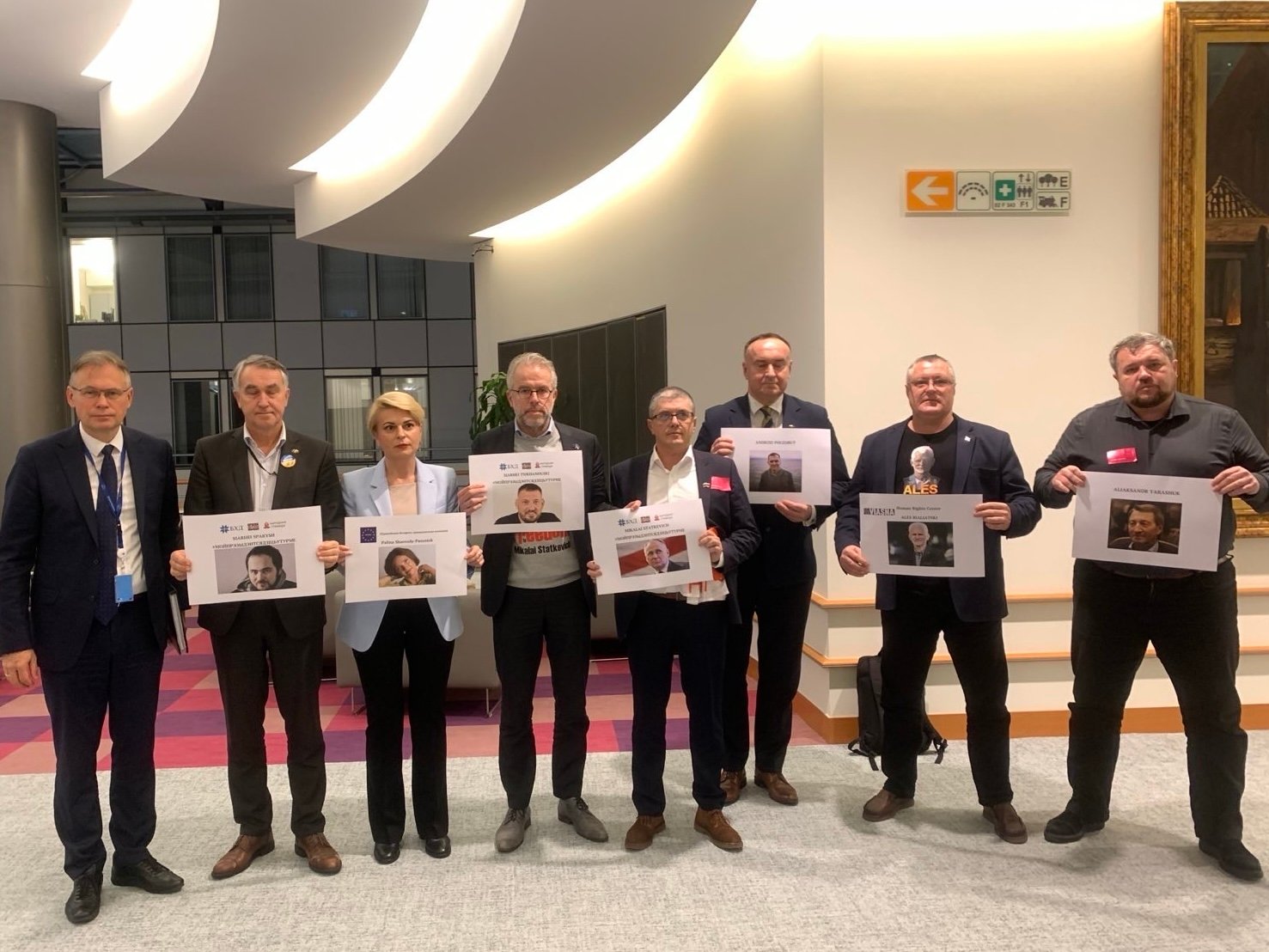'Lukashenka Does Not Understand Any Other Language'
30- 21.11.2024, 17:51
- 30,090
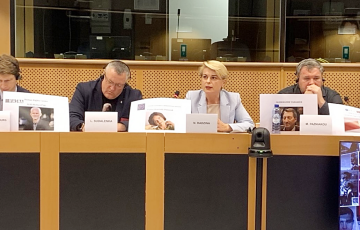
The European Parliament called for the release of Belarusian political prisoners through tough sanctions.
The European Parliament hosted a discussion entitled "Belarusian Political Prisoners: The Path to Freedom at the Cost of Freedom." The event, which took place on November 19 in Brussels, was attended by MEPs of the European Parliament, officials from the European Commission, relatives of political prisoners (whose names were asked not to be named for security reasons), Editor-in-Chief of the Charter97.org website - Natallia Radzina, and representatives of Belarusian civil society: Deputy Chairman of the Belarusian Social Democratic Party (People's Hramada) party - Yauhen Vilski, activist of an independent trade union movement - Maksim Pazniakou, human rights activist Leanid Sudalenka, head of the Country for Life public movement - Vital Saviuk, co-chairman of the Belarusian Christian Democracy - Heorhii Dzmitruk.
According to the correspondent of the Charter97.org website in Brussels, Polish MEP Arkadiusz Mularczyk proposed to seek the release of political prisoners, influencing the transit of Chinese goods through Belarus, stressing that unity is necessary for this.
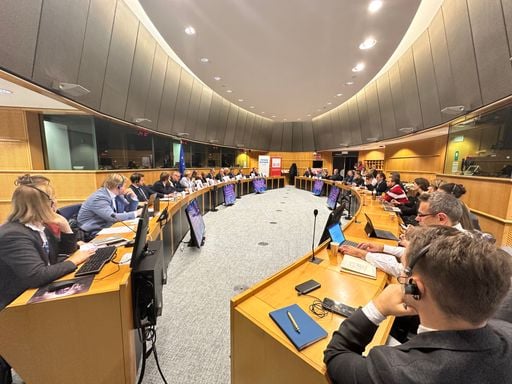
“The treatment of Belarusian political prisoners is the most brutal we have ever seen,” said Dutch MEP Thijs Reuten.
MEP from Poland Michal Scherba recalled the importance of organizing legal prosecution of the Lukashenko regime in the international arena.
Lithuanian parliamentarian Petras Auštrevičius noted that the number of political prisoners released is very small, while new arrests are taking place.
MEP from Poland Michał Wawrykiewicz stressed that a free democratic Belarus is critical for the future of our common Europe. “The only way to negotiate with a dictator is to increase pressure. Sanctions should be painful for Lukashenko," the MEP added.
Another Polish MEP Michał Kobosko expressed his solidarity with the Belarusians: "We in the European Parliament will not stop supporting you."
Editor-in-Chief of Charter97.org Natallia Radzina spoke about the terrible situation with Belarusian political prisoners and called for increased pressure on the Lukashenka regime:
"Today, all of us, Belarusians, are being silenced. Not only those living in the country, but even those who managed to escape political persecution abroad. Political terror unleashed after the 2020 presidential election continues inside the country, and the authorities initiate criminal "high treason" cases against emigrants who talk about the crimes of the regime .
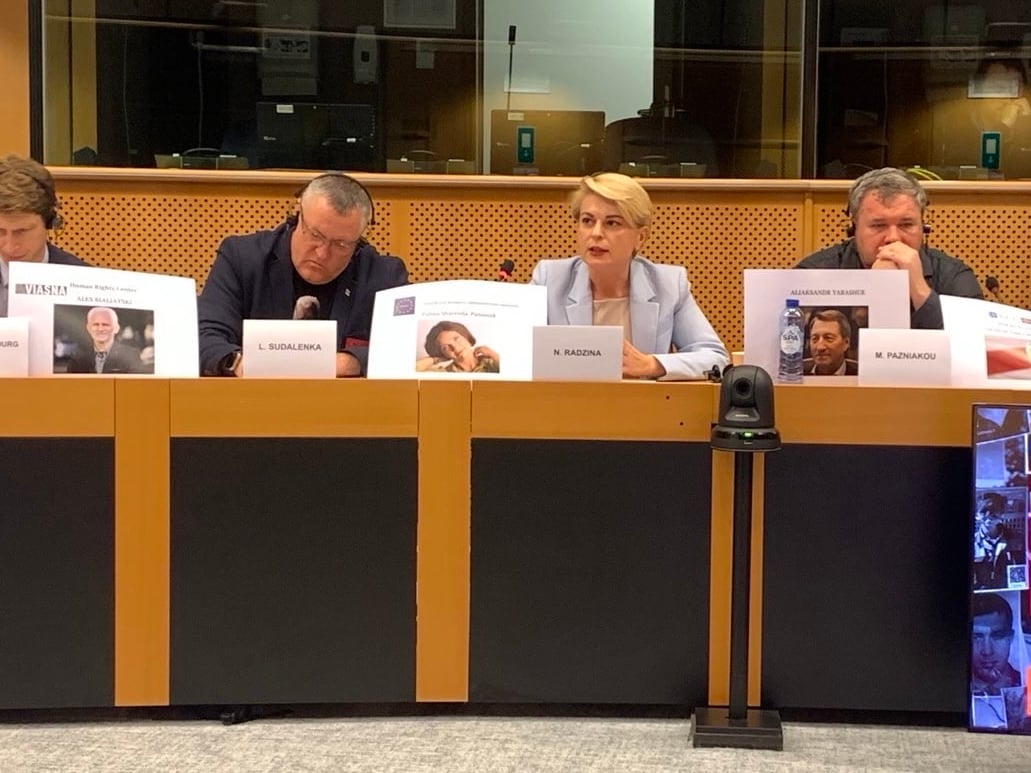
We cannot keep silent. To keep silent about political prisoners means to condemn them to death. I am a former political prisoner personally and I know that the main thing in prison is that those who are free remember you. It gives you the strength to survive.
Today, there are thousands of political prisoners in Belarusian prisons. The names of only one and a half thousand people are known, although in fact up to 10,000 prisoners of conscience may be imprisoned. Their loved ones are intimidated, they are afraid to contact human rights organizations. The other day, mass arrests again took place in Belarus — relatives of political prisoners were detained allegedly for receiving assistance from human rights defenders.
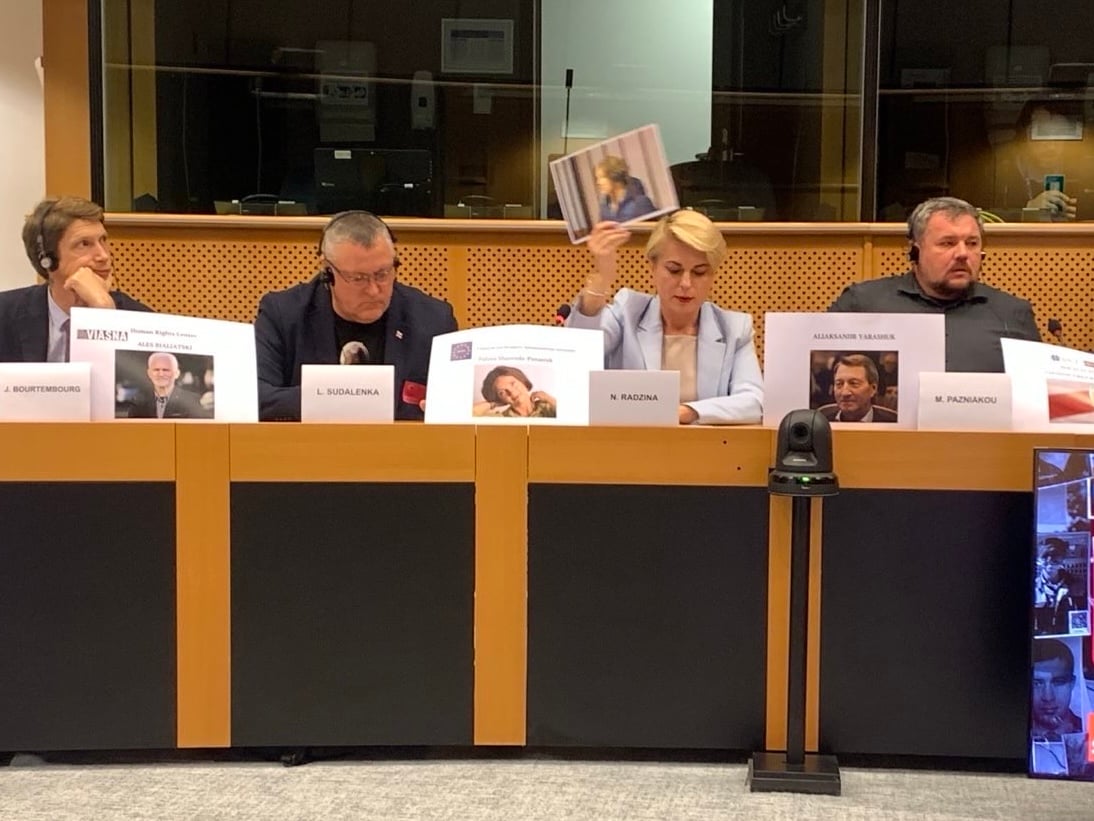
It is terrible that we do not know the names of all prisoners of conscience. But the worst thing is that we learn some names when these people die in prison.
Just two weeks ago, political prisoner Dmitry Shletgauer died in a Belarusian prison. He was a Russian citizen of German origin, he was only 22 years old. The cause of death of the young man was called strangulation. Relatives say that Dmitry could not commit suicide, he recently had a son. It is possible that he could have been killed.
Dmitry Shletgauer became the seventh political prisoner who died in a Belarusian prison.
Prior to that, the famous artist Ales Pushkin, activist Vitold Ashurak, entrepreneur Aliaksandr Kulinich, civic activist and journalist Ihar Lednik, IT specialist Vadzim Khrasko, public figure and blogger Mikalai Klimovich, public activist Dzmitry Dudoit were killed in prisons.
Political prisoners died not only in prisons, but also during detention.
It is also known that on July 5, 2023, poet Dzmitry Sarokin died of heart problems in the Lida police station after being detained.
It is also known that in 2021, two political detainees died from COVID-19 in Belarusian detention centers: Alena Amelina and [5] Siarhei Shchatsinka.
Also in 2021, a 17-year-old teenager committed suicide in Minsk due to persecution for participating in protests. He jumped from a 16-story building.
We do not know how many people actually lost their lives after torture in Belarusian prisons, because we do not know the names of all political prisoners.
And the threat to life in a Belarusian prison arises constantly. People are bullied, tortured, kept in monstrous conditions, they are not provided with treatment and good nutrition. The system of the Belarusian Gulag is trying to destroy them physically and psychologically.
Some politicians have been kept in complete isolation for years. The most terrible situation is with the leader of the Belarusian opposition, Mikalai Statkevich. Just imagine: since May 2020, that is already four and a half years (!), he has been kept in solitary confinement. And for almost two years we know absolutely nothing about him: he is forbidden to meet with a lawyer and his wife, there are no calls and letters from him. The politician is 69 years old, he has had covid four times in prison, he has heart problems.
For some, the prison term has no end. Palina-Sharendoa Panasiuk, an activist of the European Belarus Civil Campaign, a mother of two children, has already had her prison term extended three times. Recently, the fourth trial over her took place, and it is possible that in 2025 she will again be illegally convicted under the ordinary article "disobedience of the administration".
For Palina, who has a severe chronic disease (pancreatitis), this can be a death sentence. A woman is extremely ill-treated, she is constantly placed in punishment cells (a place of torture in prison), she was beaten. The necessary medical care is not provided to Palina.
I would like to talk about all political prisoners in Belarus, but I have limited time. I will say only one thing: these are real heroes, the best people of my country, and they must be saved.
You can save them only if you act from a position of strength. The dictator Lukashenka does not understand any other language. Under no circumstances should economic sanctions be lifted from the criminal regime. Even if he releases 30 exhausted and intimidated political prisoners today, he immediately takes 60 new political hostages. The essence of the dictatorial regime does not change.
There should be no easing of the regime until the release of all political prisoners and the cessation of the practice of terror. What is happening in Belarusian prisons is a crime against humanity. The Lukashenka regime has trampled on all laws: Belarusian and international. Sanctions should only be strengthened, up to a complete stop of trade with the Lukashenka regime and the transit of goods through the territory of our country. I am sure that in a very short time after the closure of borders for goods, the regime will back down and begin to release people from prisons. It is only necessary to insist on the release of all, without exception, prisoners of conscience. To do this, human rights defenders should have access to information about all people detained and convicted in Belarus.
This is not a fantastic scenario, but a very real one. Its implementation requires: political will on the part of Western countries, true compassion for people suffering from injustice and a strategic vision. After all, a free democratic Belarus is the key to regional security," said Natallia Radzina, the Editor-in-Chief of Charter97.org
Deputy Chairman of Belarusian Social Democratic Party ("Narodnaia Hramada") Yauhen Vilski recalled the fate of the leader of the Belarusian opposition, Mikalai Statkevich, who spent more than 11 years in prison. "Belarusian political prisoners are heroes of our time, we have the duty to do everything to release them," the politician said and called for tougher sanctions against the Belarusian regime. In his opinion, the sanctioning should be proportionate to the repression of political prisoners.
"Sanctions should be directed against state-owned enterprises, officials, judges and entrepreneurs working for the Lukashenka family. It is important to affect companies that profit from cooperation with Belarusian correctional institutions that use forced (in fact — slavery) labor of prisoners. Sanctions should be directly related to the cases of political prisoners," Vilski said.
“We call on the international community to start a process against those who commit crimes against humanity,” the politician added.
Head of the Country for Life public movement Vital Saviuk spoke about the situation with political prisoner Siarhei Tsikhanouski and said that "the struggle for the release of political prisoners is a public duty of everyone."
Human rights activist Leanid Sudalenka spoke about Nobel laureate Ales Bialiatski, who was imprisoned in a Belarusian prison, and noted that the persecution of political prisoners continues even after their release: "The state creates such conditions to push the newly released former political prisoners out of the country."
Co-chairman of the Belarusian Christian Democracy Heorhi Dzmitruk brought information about the leader of his party, political prisoner Pavel Seviarynets. He offered his explanation of why the Lukashenka regime has been in power for so many years: Western realpolitik and support for Russia.
Activist of the Independent Trade Union movement Maksim Pazniakou recalled that in 2023, the International Labour Organization adopted a resolution on the application of Article 33 of the ILO Constitution. "The resolution calls on all ILO member states to reconsider any relationship with the Belarusian government: cultural, political, economic, sports — any," the activist stressed.
The trade union activist noted that, unfortunately, the ILO member governments ignored the organization's decision and today it is necessary to do everything possible to apply Article 33 of the ILO Constitution, which provides for a trade embargo against the Belarusian regime.
Deputy Director General of the Directorate General for Neighbourhood & Enlargement Negotiations Hubert Duhot named the main components of the EU strategy towards Belarus: solidarity, support and sanctions. "The EU and the European Commission will continue to stand in solidarity with Belarus," the official said.
Julien Bourtembourg, the Deputy Head of the European External Action Service for Georgia, Moldova, Armenia, Azerbaijan and Belarus, said that the European Union will not recognize the upcoming so-called "elections".
“We need more than words of solidarity. We need action," the diplomat stressed.
